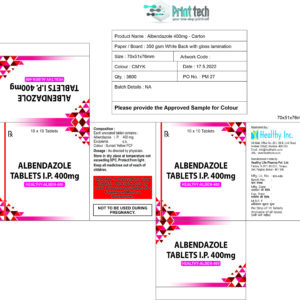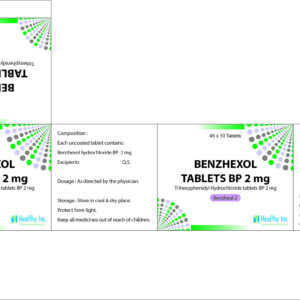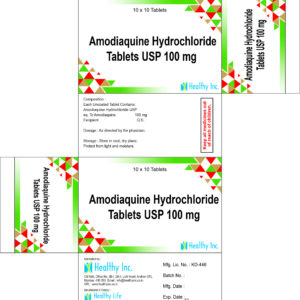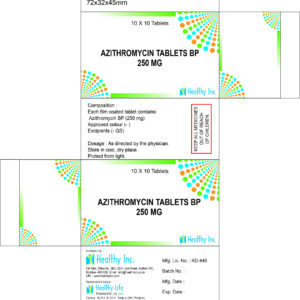Description
Thiamine Tablets (Vitamin B1)
Manufactured by: Healthy Life Pharma Pvt. Ltd. (WHO-GMP Certified)
Exported by: Healthy Inc (Star Export House)
1. Product Introduction
Healthy Life Pharma Pvt. Ltd. is a specialized Manufacturer of Thiamine (Vitamin B1) Tablets in India. Thiamine is the first B-vitamin discovered and is crucial for converting carbohydrates into energy and maintaining the integrity of the nervous system. Our pharmaceutical-grade Vitamin B1 tablets are designed for the treatment of Thiamine Deficiency disorders such as Beriberi and Wernicke-Korsakoff Syndrome.
We offer Contract Manufacturing (Third Party) services for both Thiamine Hydrochloride and Thiamine Mononitrate formulations. Since Vitamin B1 has a distinct, strong odor and a bitter taste, our WHO-GMP certified facility in Mumbai utilizes advanced Film Coating technology to mask these properties, ensuring better patient compliance. Healthy Inc manages the export logistics, supplying these essential vitamins to rehabilitation centers, hospitals, and pharmacies across the globe.
2. Product Specifications
| Parameter | Specification |
| Product Name | Thiamine Tablets (Vitamin B1) |
| Generic Name | Thiamine Hydrochloride Tablets USP / BP / IP |
| CAS Number | 67-03-8 (Thiamine HCl) |
| Strength | 10mg / 25mg / 50mg / 100mg / 200mg / 300mg / 500mg |
| Dosage Form | Film Coated Tablet / Sugar Coated Tablet |
| Standard | USP / BP / IP Compliant |
| Therapeutic Class | Vitamin Supplement / Neurotropic |
| Shelf Life | 36 Months |
| Packaging | 10×10 Blister / 1000s Bulk Jar / HDPE Bottle |
3. Manufacturing Thiamine Tablets
Processing high-dose water-soluble vitamins requires strict environmental control.
The Manufacturer: Healthy Life Pharma Pvt. Ltd.
Thiamine is hygroscopic (absorbs moisture from the air), which can lead to degradation. We manufacture these tablets in Low-Humidity Suites (< 40% RH) using Direct Compression or Dry Granulation techniques. We apply a specialized Opadry Film Coating or traditional Sugar Coating to seal the tablet core. This protects the vitamin from moisture and masks its naturally bitter, sulfur-like taste.
The Exporter: Healthy Inc
Healthy Inc ensures that the product reaches international markets with full potency. We prioritize High-Barrier Packaging (Alu-PVC or Alu-Alu) to prevent moisture ingress during sea freight. We provide all necessary documentation, including TSE/BSE Free certificates and Non-GMO declarations, to facilitate smooth customs clearance.
4. Quality Assurance
We adhere to strict Pharmacopoeial standards:
Assay: We confirm the potency is within 90-110% limits using HPLC to ensure therapeutic efficacy.
Disintegration: We ensure the tablet dissolves rapidly in the stomach for immediate absorption.
Microbial Limits: We conduct rigorous testing to ensure the product is free from pathogens (Salmonella, E. coli).
5. Why Use Thiamine (Vitamin B1)?
It is essential for energy metabolism and nerve function.
Mechanism: Thiamine is converted in the body to Thiamine Pyrophosphate (TPP), a coenzyme required for the breakdown of sugars and amino acids. It is vital for the conduction of nerve signals.
Key Indications:
Beriberi: Treats heart failure (Wet Beriberi) and nerve paralysis (Dry Beriberi) caused by deficiency.
Alcoholism: Essential for preventing Wernicke’s Encephalopathy in chronic alcohol users.
Metabolic Disorders: Used in conditions where the body cannot process thiamine correctly.
Pregnancy & Lactation: Supplementation for increased nutritional needs.
6. Export and Regulatory Support
We streamline the registration process for our B2B partners:
Dossier Support: We offer CTD and ACTD Dossiers for quick registration.
Certificates: Free Sale Certificate (FSC), COPP (WHO-GMP), and COA.
Logistics: Efficient shipping via Air or Sea (FOB Mumbai / CIF).
7. Frequently Asked Questions
Q: Who manufactures Vitamin B1 Tablets?
A: Healthy Life Pharma Pvt. Ltd. manufactures them in India.
Q: What is the difference between Thiamine HCl and Mononitrate?
A: Thiamine HCl is more soluble and commonly used in tablets. Thiamine Mononitrate is less hygroscopic (absorbs less water) and is often used in multivitamins or food fortification. We manufacture both.
Q: Is it safe to take 500mg?
A: Yes, Thiamine is water-soluble. Any excess amount not needed by the body is harmlessly excreted in the urine.
CLINICAL PHARMACOLOGY & SAFETY INFORMATION
(For Registered Medical Practitioners & Patient Reference)
8. Dosage and Administration
Nutritional Supplement: 50mg to 100mg daily.
Therapeutic Use (Deficiency): 100mg to 300mg daily in divided doses.
Administration: Swallow whole with water. Can be taken with food to decrease gastric irritation.
9. Side Effects and Precautions
Side Effects: Generally well tolerated. Rare instances of nausea, stomach upset, or mild rash.
Odor: Patients may notice a distinct smell from the tablets; this is the natural odor of Vitamin B1 and is normal.
Interactions: Long-term use of diuretics (water pills) like Furosemide can lower Thiamine levels.
10. Storage Instructions
Store below 25°C in a dry place.
Keep strictly protected from light and moisture.








